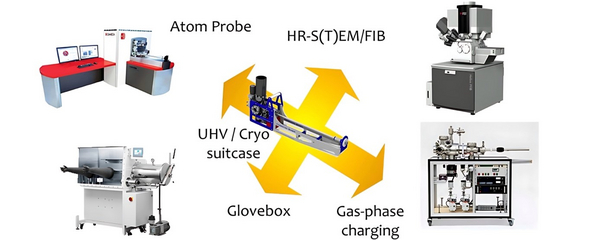B08 – Defect phase formation by hydrogen in nickel alloys



PI(s):
Marcus Hans (Chair of Materials Chemistry, RWTH Aachen)
Dierk Raabe (Max-Planck-Institute für Eisenhüttenforschung)
SFB researchers:
Mohamed Elkot (Max-Planck-Institut für Eisenhüttenforschung)
Project B08 is primarily concerned with the interaction of hydrogen and oxygen with selected binary and ternary Ni-Cu-(Nb), Ni-Au-(Nb) and Ni-Nb alloys. The nickel alloys will be provided by projects B02 and S, while B08 will add a further degree of complexity to these binary and ternary samples by including hydrogen and oxygen. We will study the respective influence and effect of hydrogen and oxygen on defect phase formation, such as nickel-hydrides and -oxides, which have been predicted theoretically, but have not been observed experimentally. This applies in particular to the theoretically predicted possibility that, at sufficiently high partial pressures of hydrogen, nanoscopically small hydrides could form for example in the dislocation core, a state which is not thermodynamically favoured outside of the dislocations in nickel. Therefore, individual dislocations (as well as dislocation pile-ups) will be generated, loaded with hydrogen and investigated correlatively with regard to the formation of nano-hydrides using atom probe tomography and electron microscopy. Moreover, the effect of oxide structures and their surface faceting on the dissociation of the hydrogen molecules is of interest on a nanoscopic scale and the subsequent diffusive penetration of the hydrogen into the material is being investigated. Controlled oxygen incorporation in hydrogen-loaded sample surfaces will be realised using an in vacuo setup, followed by nanoscale compositional analysis using atom probe tomography. The project will intensely collaborate with B01, B03, B04, B05 and C03.



